Samsung SSD 850 Pro (128GB, 256GB & 1TB) Review: Enter the 3D Era
by Kristian Vättö on July 1, 2014 10:00 AM ESTRandom Read/Write Speed
The four corners of SSD performance are as follows: random read, random write, sequential read and sequential write speed. Random accesses are generally small in size, while sequential accesses tend to be larger and thus we have the four Iometer tests we use in all of our reviews.
Our first test writes 4KB in a completely random pattern over an 8GB space of the drive to simulate the sort of random access that you'd see on an OS drive (even this is more stressful than a normal desktop user would see). We perform three concurrent IOs and run the test for 3 minutes. The results reported are in average MB/s over the entire time.
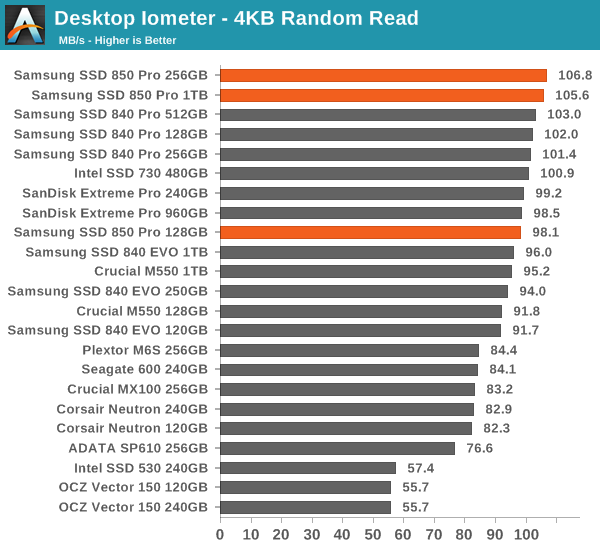
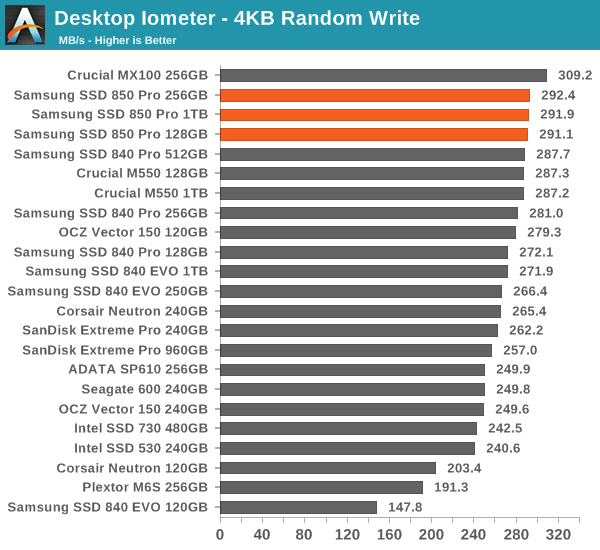
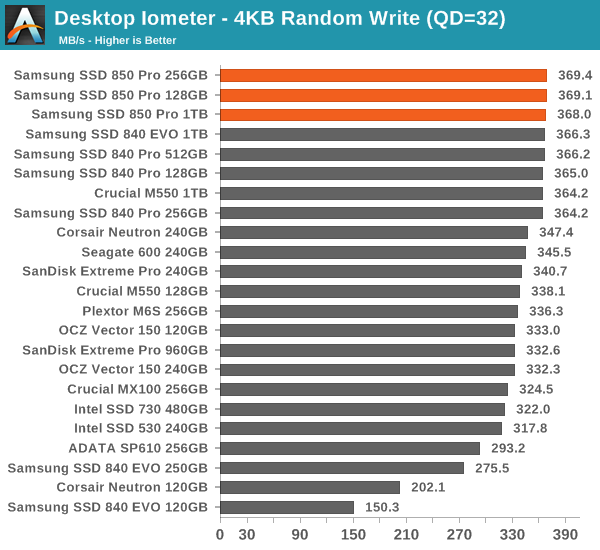
Random performance is also brilliant and the 850 Pro tops almost all of our benchmarks. It is no wonder why it is so fast in the Storage Benches.
Sequential Read/Write Speed
To measure sequential performance we run a 1 minute long 128KB sequential test over the entire span of the drive at a queue depth of 1. The results reported are in average MB/s over the entire test length.
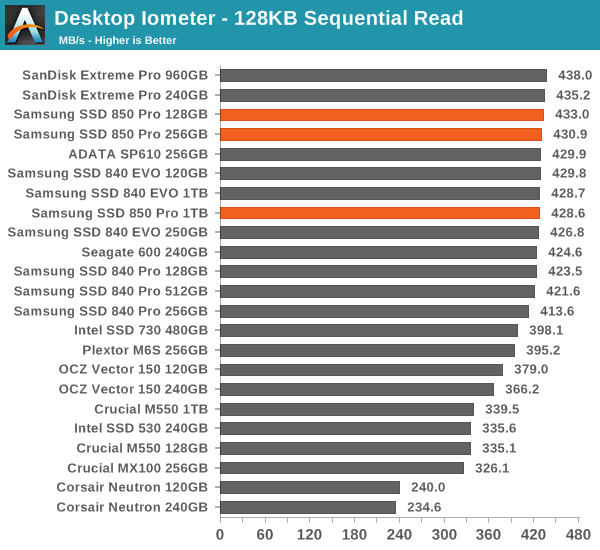
The same goes for sequential speeds. Of course, the differences are not substantial but nevertheless the 850 Pro is fast.
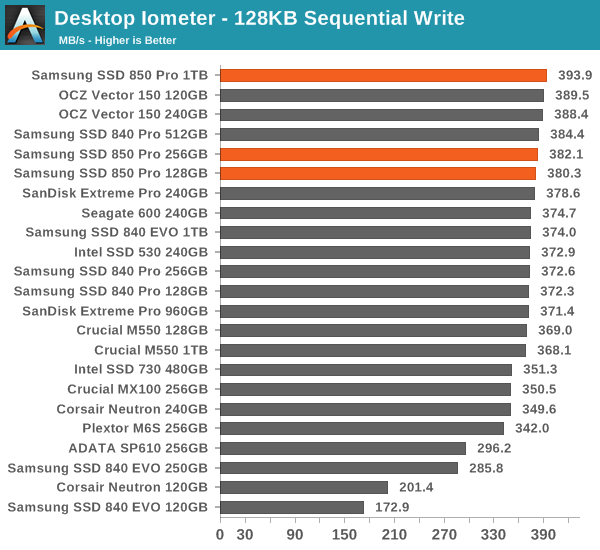
AS-SSD Incompressible Sequential Read/Write Performance
The AS-SSD sequential benchmark uses incompressible data for all of its transfers. The result is a pretty big reduction in sequential write speed on SandForce based controllers, but it doesn't impact most of the other controller much if at all.
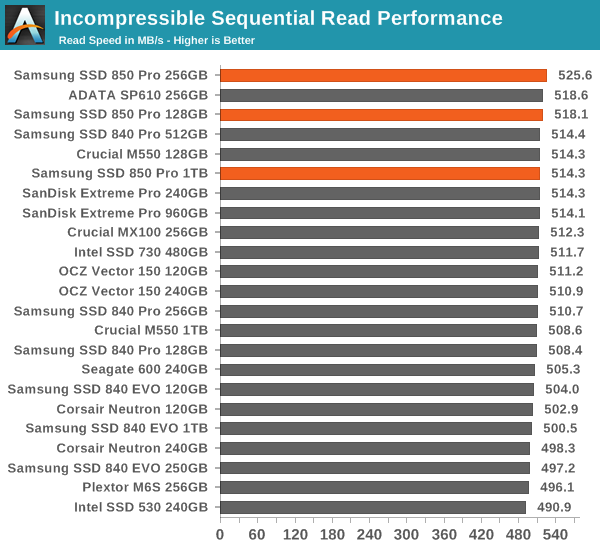
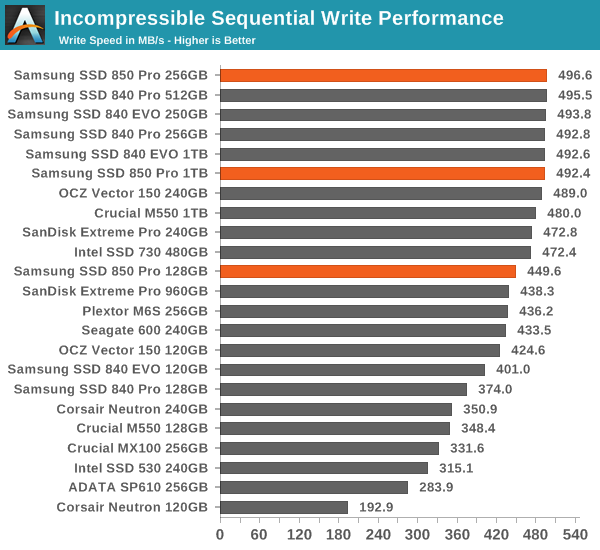










160 Comments
View All Comments
Pastuch - Wednesday, July 2, 2014 - link
When will we see Vnand in smart phones? This 16gb Nexus 5 is brutal! Always out of space.ajlueke - Wednesday, July 2, 2014 - link
Page 1, "Scaling below 20nm was seemed", I believe you intended "Scaling below 20nm was seen".Automaticman - Wednesday, July 2, 2014 - link
Can current EVO 840 users upgrade to Magician 4.4 and get the benefits of RAPID 2.0 (assuming they have >16GB DRAM)?bsd228 - Wednesday, July 2, 2014 - link
just as RAPID support was extended to the 840 PRO, I would expect this to support the 840 pro/evo soon, if not right off the bat.Automaticman - Sunday, July 6, 2014 - link
Well, I was certainly able to upgrade to Magician 4.4, and it did take a couple reboots while it was re-activating RAPID. I am going to guess and say yes it seems to be the new version of RAPID, but I don't see anywhere that it actually says RAPID 2.0 or any indication of how much memory it has available.sirvival - Wednesday, July 2, 2014 - link
Ah ok.When I select the 470 in Bench there is no slumber so I got confused.
Since power cosumption is a big thing in Mobile could you do the following:
Bench the impact on the Battery of a Laptop due to a fast drive.
E.g. drive A is fast but has the downside that it draws more under load as drive B which is slower. But since its done faster it returns to idle faster.
I mean impact on real world scenarios.
Or how much power was used for bench x etc. and have a average per hour or something like that.
sirvival - Wednesday, July 2, 2014 - link
damn this was to be a reply tohttp://www.anandtech.com/comments/8216/samsung-ssd...
sorry
Nickat - Thursday, July 3, 2014 - link
Thank you so much. You explained everything so well.Stokkolm - Thursday, July 3, 2014 - link
Newegg still has them for preorder at the more expensive price, hopefully they drop those before the release date.skarthikeyan - Monday, July 7, 2014 - link
Hi, How come random read is 106.8MB/sec and random write is 292.4MB/sec for the SSD 850 Pro 256 GB? Aren't writes supposed to be slower than reads?